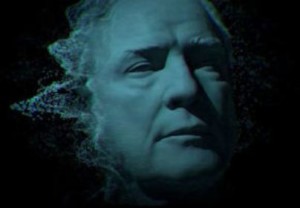 What do we know about Marlon Brando? We know that he’s one of the most influential film actors that ever lived. He electrified audiences in his early work from the 1950s—we immediately think of A Streetcar Named Desire and On the Waterfront, but there were other early iconic roles as well. Brando also suggests an aura of disappointed expectations—movies and performances, especially in the 60s, that were considered failures or misfires. There was a big comeback in the 1970s with The Godfather and Last Tango in Paris. And then, more failures, more misfires. He gained a reputation for being difficult, obscure, even a little crazy. He was ridiculed as an older man for becoming so overweight. And his personal life was fraught with conflict and tragedy.
What do we know about Marlon Brando? We know that he’s one of the most influential film actors that ever lived. He electrified audiences in his early work from the 1950s—we immediately think of A Streetcar Named Desire and On the Waterfront, but there were other early iconic roles as well. Brando also suggests an aura of disappointed expectations—movies and performances, especially in the 60s, that were considered failures or misfires. There was a big comeback in the 1970s with The Godfather and Last Tango in Paris. And then, more failures, more misfires. He gained a reputation for being difficult, obscure, even a little crazy. He was ridiculed as an older man for becoming so overweight. And his personal life was fraught with conflict and tragedy.
But still, there’s always been something elusive about Brando the man. Now there’s a documentary film directed, or perhaps I should say assembled, by Stevan Riley, called Listen to Me Marlon. But this film is unlike any biographical film you’ve ever seen. It turns out that over the course of his life, Brando made over 300 tape recordings, reminiscences about his life and career; thoughts about acting, society, politics, and psychology; even tapes labeled “self-hypnosis,” what we would probably call guided meditations today. It’s from the latter that the film gets its title Listen to Me Marlon—Brando guides himself into states of calmness and serenity on these tapes. Clearly he had a need to break free of the inner turmoil that would overwhelm him.
As we listen to Brando’s voice, selected by Riley from many different recording sessions over long periods of time, we see clips from his films as well as home movies, TV interviews, public appearances, news reports and stills. There is no narrator, no talking head interviews, only Brando himself giving his side of the story. It’s as close to an autobiographical film by the iconic actor, who died in 2004, as we’re ever going to get. One remarkable visual theme stands out—Brando had a digital image of his head made towards the end of his life, and this strange and ghostly visage reappears from time to time, reciting Shakespeare or otherwise making odd and stirring pronouncements about life and fate.
This fascinating film shares deeply personal insights on Brando’s childhood—both parents were alcoholics, and his father was abusive—also his beginnings as an actor in New York, learning his craft from the renowned teacher Stella Adler, and his sudden fame and his titanic struggles with, and rejection of, his celebrity. The overall impression is one of deep melancholy. Brando was a very sensitive and lonely person who came to hate the phoniness and greed of Hollywood. The effort it took to create his greatest performances was profoundly exhausting—he could only rarely sustain that effort. His two children were scarred by tragedy—his son Christian went to prison for killing the boyfriend of his sister, Cheyenne. Five years later, Cheyenne died of suicide.
Brando presents a complex, sometimes contradictory view of himself on the tapes. We can see that his inability to form lasting relationships damaged his kids. We also see his nobler side—his commitment to the civil rights movement and the Native American movement, his playfulness and sense of humor. Listen to Me Marlon, in contrast to the usual voyeuristic approach to famous actors and celebrities, lets the subject speak for himself, and the result is powerful and utterly unique.

